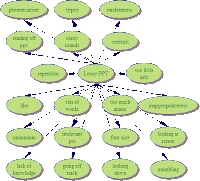Earlier this summer, discussions surrounding granting email to our MS boys proved to be fruitful. There was sufficient interest and a desire by the faculty that the new incoming MS Head, Phil Spears, decided it was time to provide our boys with this tool. We spoke about this a number of times before the start of school, but we couldn't find the right time or place to introduce the boys to this form of communication within their academic experience. We didn't want to throw up a bunch of rules but we did want to connect this new responsibility to character development. So we looked at the calendar and found just the right spot-right after a series of presentations involving Honor.
Honor at St. Christopher's School: A brief digressionAt
St.Christopher's School, we have an Honor Code that is deeply rooted into the fiber of our school's persona. So much so, that when asked, alums always mention the importance of Honor at St. Christopher's and later in life.
After a chapel session on the topic of Honor and nominations and voting of our student representatives to the honor council, our school had a ceremony in which all of the students and faculty signed the Honor Pledge. So the stage was set for our middle school boys to learn about digital citizenship as it relates to having access to email.
To summarize, I started by introducing the
value of a signature-"your signature" because your signature is as important as your word. Our boys sign an Acceptable Use Policy over the summer but this venue reminded them how they should behave as it relates to technology while connecting it to the signing the honor pledge.
Because our teachers requested email for their students,
a request becomes an opportunity.
A brief presentation surrounding one's
digital footprint follows with questions about do you Google well, because your footprints don't wash away as easily as they do on the beach.
The last question posed to the boys was
What kind of footprint do you have? Are you the same person online as you are offline? And, How does your footprint make you feel?
At this point, Phil Spears, the MS Head, adapts a presentation that will be given later in chapel regarding First, Second, and Third class citizens by our MS Asst Head, Ken Miller.
Here are Phil's words:
Email is a wonderful avenue for communication when used well.
Primary means for teachers here.
What kind of cyber-citizen are you and will you show in your use of email?
3 classes.3rd class cyber-citizen, as he chats, facebook/my-spaces/tweet/texts AND emails…
·Is mean
·Gossips/rumors
·Hides behind cloak of anonymity
·Acts like a different person
·Writes things he wouldn’t say in person or on the phone
·Goes hunting for things on-line he knows in his heart he’s not ready for and/or aren’t healthy for him
2nd class…·Most people here – adults and kids
·Follows rules
·Communicates clearly and in a friendly way
·Doesn’t mistreat others
·Does pass along or participate in 3rd class activity
·Does lie on-line or about what he’s done there
1st class…·Does what a 2nd class citizen does, but also
·Actively seeks to make cyberspace a safe, fun place for all
·Challenges a 3rd class citizen to cut out poor behaviors
·Considers HONOR a code of conduct applicable to the digital world
So what kind of citizen are you?
 My first selection was Clay Shirky's book "Here Comes Everybody", and so far the experience has been quite good. I have the ability to bookmark pages but I am unable to search, highlight or take notes. However, it appears that the hide notes and marks features will be coming soon as they are listed in the drop down.
My first selection was Clay Shirky's book "Here Comes Everybody", and so far the experience has been quite good. I have the ability to bookmark pages but I am unable to search, highlight or take notes. However, it appears that the hide notes and marks features will be coming soon as they are listed in the drop down. 






